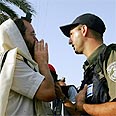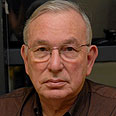A. As the disengagement fervor died down and and it turned out there were no fatalities from the withdrawal, I worked out that from the time Yaakov Yisrael Dehan was murdered in 1924 until Yitzhak Rabin was killed in 1995, intra-Jewish politics claimed the lives of about 60 people.
If we add Israeli Arabs to the mix, the number shoots up to about 100.
Most of the victims were murdered in Kfar Qassem (1956), on the 1976 "Land Day", and during the October riots in October, 2000.
Compared to the issues that are tearing us apart, and compared to the things other peoples do to each other, we can safely say that Zionism has been very stingy with respect to the amount of blood spilled on its watch.
But don't underestimate this reality. Since Zionism was born at the end of the 19th century, the world has known no shortage of civil wars, military takeovers, and bloody riots, in which millions of people have been killed by their own peoples.
It would seem the chances are against us, because we are a high-strung society of immigrants, segregated by different traditions, without a common mother-tongue, but with differing economic classes and competing ideologies.
It would appear that the self-control is just like the story of the destruction of the second Temple in Jerusalem, with a fractured Jewish culture that became more sophisticated in exile and found its expression in the Talmud, in remembering the Holocaust, and mainly in the threat of a hostile environment hanging over our heads . There is no glue stronger than fear.
The bothersome question – and I am not the first to present it – is whether this is an exaggerated, calculated fear, aimed at sparing us the need to fight over the face of our country and society. Is Israel more frightened of the danger of peace than it is scared by the danger of war?
B. Many disengagement opponents rushed to use the images and terminology of the Holocaust: "Transfer", "Nazi", orange stars, and others.
We object to Holocaust denial, but here in Israel the phenomenon is even more common than in other places; therefore, we have no moral right to complain when other people support the same ideology.
Some non-Jewish Holocaust deniers ignore the facts, but the wise ones don't deny them. Rather, they try to minimize their significance, as if the Holocaust has no particular significance, and is just one more link in a long chain of human cruelty.
With us, the denial takes another form: Many people make disgusting comparisons, comparisons that do even more damage than open denial. With outright denial it's possible to do battle by presenting the facts; but saying, "It's just like…" leaves the opponent speechless.
These claims slowly trickle in and penetrate, screwing up our collective ability to measure things correctly: If withdrawing to our internationally recognized borders is a "holocaust," and if IDF soldiers who gently attend to the needs and emotions of evacuees are "just like" the Gestapo, how can we ever dare complain about Arab claims that Israel is "just like" Nazi Germany?
C. I have tried to take a break from these dramatic days to guess how this week will be remembered in 50 years. The more I think about it, the more I think it will be the week that the great Hebrew author and poet Dalia Rabikovitch died.
A minority of researchers, historians and political scientists will remember the disengagement as a first step towards establishing a permanent border between us and the Palestinians, but every school child in Israel will befamiliar with Rabikovitch's stories and poems.
She will be remembered, of course, as long that Hebrew culture isn't plundered by ultra-Orthodox culture, or trampled by American culture.

















